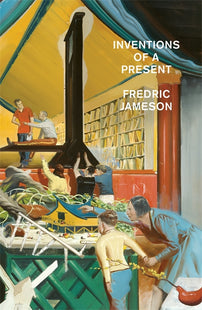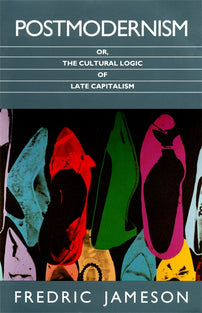Unintimidated Languages: Jameson at 90
In honor of Fredric Jameson's 90th birthday this month, we're publishing a series of short essays focused on the major books in Jameson's oeuvre. Here, Daniel Hartley revisits Jameson's first book, Sartre: The Origins of a Style (1961).

From the first sentence of Jameson’s first book, the dialectic is in motion:
It has always seemed to me that a modern style is somehow in itself intelligible, above and beyond the limited meaning of the book written in it, and beyond even those precise meanings which the individual sentences that make it up are designed to convey. Such supplementary attention to style is itself a modern phenomenon.[1]
The first sentence establishes the path of the object: the scriptural instances that are the material basis of modern style, even as its intelligibility seems to transcend them. Jameson’s sentence itself is breezily authoritative, ‘seemed to me’ implying an openness to potential disagreement that is somewhat belied by the extreme precocity of the adverb ‘always’. Yet, no sooner is this casually confident tone established, than the second sentence undermines it: it reflects back upon the first and imbues it with a certain structural irony, since we now learn that what we thought was an objective fact (modern style) may also be the result of a historically specific subjective attention. The path of the subject has momentarily usurped that of the object, and there is no guarantee of easy reconciliation since the entirety of Sartre: The Origins of a Style pursues in minute detail the linguistic consequences of an ‘arrested dialectic’ in which being and consciousness are condemned forever to remain apart.[2]
It is precisely on this site of apparent hopelessness that Sartre’s style is born. His works ‘arise on a place which should have made them impossible … a language is forced up into existence in the very silence which ought to take its place’.[3] Each pole of the opposition, and their innumerable avatars, is discovered to suffer from some representational dilemma or intrinsic lack. Acts fall away into an unrepresentable facticity from which subjective motivation comes unmoored, such that no number of gestures or deeds is any more able to rescue a solidity of meaning than an endless retroactive reflection on what might have caused one to act in the first place. Likewise, since consciousness is precisely ‘not-being’, any attempt to name it risks a figural reification that can only ever betray its intrinsically self-projective emptiness. Inherited moral values such as ‘good’ or ‘cowardly’, and emotional states such as ‘angry’ or ‘sad’, are revealed to be representational reifications of a much more complex constellation of shifting sensations, producing a ‘struggle of unique qualities against the names that both fix them and make them too general’ (in an early version of the opposition Jameson would later develop between emotion and affect).[4]
[book-strip index="1"]
At every turn, however, Sartre’s style emerges triumphant from the immanent failures of being and consciousness; their respective lacks become openings through which his words can thread, like a Möbius strip temporarily looping one into the other. Language, on this view, drags being forth into articulation, and, precisely for this reason, style itself comes to assume an ontological import. It is no coincidence that Sartre himself, in a bravura essay on Faulkner’s style, insists that every novelistic technique refers back to a metaphysics. In Faulkner’s case, characters are haunted by an impossible past to which they necessarily fail to live up, subject to a despair in which the future is blocked [barré]. ‘I admire his art,’ writes Sartre, ‘but I don’t believe in his metaphysics: a blocked future is still a future.’[5] This emphasis upon the ontological valence of modern style has philosophical repercussions. As Jameson writes, ‘the search for the proper expression is the same as the search for the wholly adequate notion’.[6] This explains why Jameson repeatedly transposes philosophical concepts into representational problems, which (in his later work) will be revealed as so many symbolic resolutions of real social contradictions.
It also explains why he would later pose the problem of postmodernism as both historical and representational. In the midst of a globally ‘blocked future’, he would adopt the method he learned from Sartre: ‘the straining at a fixed “set of conditions” until it yields a temporal expression of itself, the transformation, by fiat, of a static dilemma into fable and action.’[7] In the face of a devastating historical defeat for Marxism, Jameson invented an ‘unintimidated language for which there is nothing that cannot be said.’[8] Sartre is cast in this book as what Jameson would eventually come to call a ‘late modernist’. Part of his situation was precisely the existence of those high modernist forebears who had apparently exhausted ‘the possibilities of direct experimentation’ and ‘the multiplicity of new roads traced’.[9] Is this not precisely our situation today with respect to Jameson himself? His Sartrean philosophy should warn us against celebrating his 90th birthday by simply showering him with accolades that ‘are impossible to feel from the inside because consciousness never “is” anything, but is always in action’.[10] So let us put it, instead, in Sartrean terms: Jameson remains the untranscendable horizon of our situation. May he long be in action, and may we have the courage to invent unintimidated languages of our own.
[book-strip index="2"]
[1] Fredric Jameson, Sartre: The Origins of a Style (New Haven; London: Yale University Press, 1961), vii.
[2] Jameson, 182.
[3] Jameson, 202, 204.
[4] Jameson, 136. He develops the opposition most fully in The Antinomies of Realism (London: Verso, 2013).
[5] Jean-Paul Sartre, Critiques Littéraires (Situations, I) (Paris: Gallimard, 1947), 74-5.
[6] Jameson, Sartre, 67.
[7] Jameson, 203.
[8] Jameson, 204.
[9] Jameson, 202.
[10] Jameson, 7.

